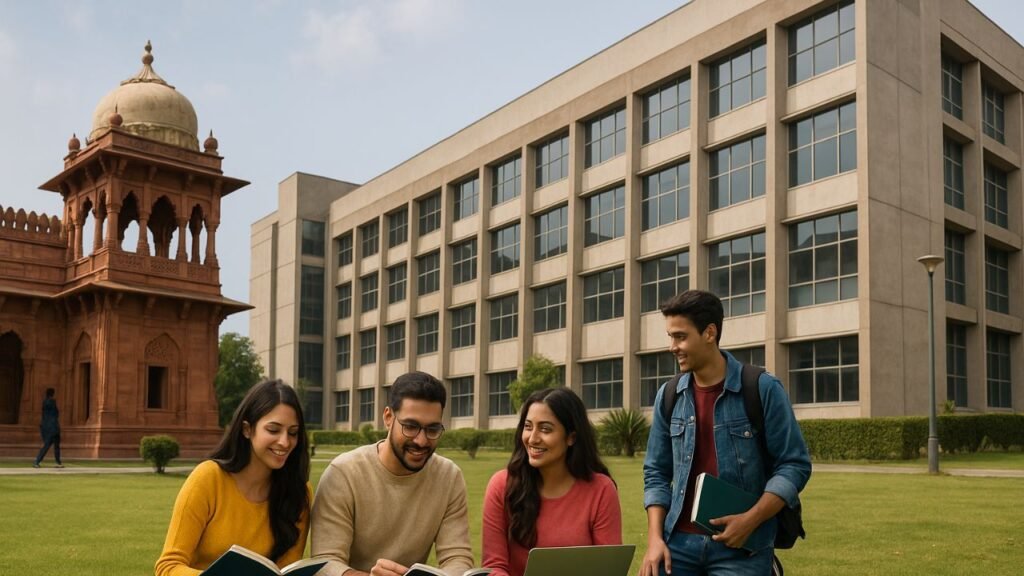Quality Education – Quality education is not just about classrooms and textbooks; it is a holistic experience where values, infrastructure, and innovation come together to nurture young minds. Institutions that focus on providing education backed by tradition, culture, and modern facilities ensure that students grow with both intellectual depth and moral grounding. Tradition helps preserve timeless values, while culture strengthens identity and belonging. At the same time, modern infrastructure, from digital classrooms to advanced laboratories, prepares students to meet global challenges. According to UNESCO, quality education is one of the key pillars of sustainable development, as it empowers individuals and communities to build better futures. By combining heritage with innovation, schools and colleges create an environment where students can excel academically, socially, and emotionally. This balance allows them not only to pursue careers but also to contribute meaningfully to society. Institutions that integrate these three pillars provide the true foundation for lifelong learning and progress.

Preserving Tradition While Embracing Modern Education
Educational institutions that value tradition ensure that students are connected to their cultural roots while being prepared for future opportunities. Traditional practices, such as community learning, moral education, and respect for elders, continue to play a vital role in shaping character. At the same time, integrating modern subjects like technology, science, and business management equips learners with practical tools needed for success. The National Education Association emphasizes that effective schools build on both past experiences and present needs, creating a strong foundation for holistic learning. This dual approach ensures that students respect their heritage while also adapting to the fast-changing world. Tradition serves as an anchor, while modern education acts as the sail, guiding young learners toward brighter horizons. Schools that embrace both aspects foster balanced, well-rounded individuals capable of leading with wisdom and innovation.
Cultural Awareness as a Cornerstone of Quality Education
Culture plays a powerful role in education by building identity, inclusivity, and a sense of belonging. When schools celebrate cultural festivals, languages, and art forms, they encourage diversity and respect. The World Bank notes that cultural inclusion in education strengthens social cohesion and reduces inequality. Students exposed to cultural diversity learn tolerance, empathy, and collaboration, which are crucial in today’s interconnected world. Moreover, cultural learning helps them appreciate their own roots while respecting others, making them global citizens with local values. Whether it is through music, literature, or traditional crafts, culture enriches education and makes it more meaningful. By blending academic excellence with cultural wisdom, institutions ensure that learners grow into compassionate and socially responsible individuals. Education backed by culture prepares students not just for careers, but for leadership in diverse communities.
The Role of Modern Infrastructure in Student Development
Modern infrastructure transforms the learning experience by providing tools and facilities that make education more practical and engaging. Smart classrooms, computer labs, science laboratories, libraries, and sports facilities all contribute to an environment where students can learn effectively. According to UNICEF, investment in educational infrastructure is directly linked to better learning outcomes and student well-being. Well-equipped campuses ensure that learners get hands-on experience, bridging the gap between theory and practice. For example, digital learning tools allow students to access global resources, while science labs nurture curiosity and innovation. Sports complexes and cultural halls promote extracurricular growth, encouraging teamwork and creativity. Infrastructure also includes essential support systems like clean drinking water, safe campuses, and transportation facilities, ensuring accessibility for all. A strong physical foundation strengthens intellectual growth and empowers students to achieve excellence in every field.
Building Future-Ready Learners Through Integrated Education
True quality education is achieved when tradition, culture, and infrastructure come together to build a strong learning ecosystem. Students nurtured in such environments grow with knowledge, values, and practical skills. They become confident, innovative, and resilient, ready to face global challenges. Reports by the OECD highlight that future-ready learners must be equipped with creativity, critical thinking, and adaptability in addition to academic excellence. By embedding values from tradition, inclusivity from culture, and opportunities from infrastructure, educational institutions create leaders who think beyond themselves. These students not only excel in exams but also take responsibility for community development and nation-building. Education, when backed by these three essential pillars, becomes more than a degree—it becomes a lifelong journey of empowerment and contribution. For parents, educators, and policymakers, supporting this integrated approach is key to shaping societies that are progressive yet deeply rooted in their identities.








